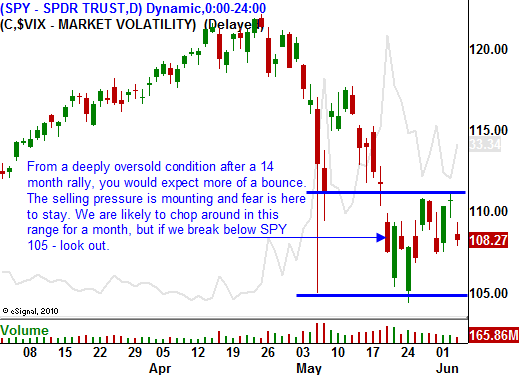Private Sector Is Not Hiring. Weak Employment Signals Double Dip Recession!
Overnight, a new twist to the European credit crisis was revealed. Hungary now believes it is close to default and it will also need financial aid from the IMF. As I've been mentioning for months, the line for handouts will grow. In the not-too-distant future a larger country like Spain or Italy will find themselves in dire straits. That is when the problem will become too big.
Germany and France are considered the strongest EU members. Both have tremendous investments throughout the union and if countries default, it would have a devastating impact on their balance sheets. Germany will try to do what it can in the early stages, but eventually a breaking point will be reached. They won’t throw good money after bad. From that point on, each country will have to fend for itself and the EU will collapse.
Liberal spending policies and generous social programs can't continue into perpetuity. There is not enough money to go around and decades of deficits are taking their toll. We have reached the inflection point where bondholders fear that they will not get their money back. As a result, the cost of capital is escalating.
S&P 500 companies get 25% of their profits from Europe. They will not start hiring until they see conditions improve. Private-sector jobs have been very slow to recover and that was apparent in today's Unemployment Report.
In May, we added 431,000 jobs. That was way below consensus estimates which expected 500,000 new jobs. More importantly, 411,000 of those jobs came from Census workers. This is temporary employment and it will reverse itself in a few months. That means only 20,000 jobs came from the private sector. As I've been stating this week, I believe this will mark the peak of this employment cycle.
Government stimulus programs are winding down and those people have already been hired. In coming months, state and local governments will be laying off workers. Budgets need to be balanced and they are running huge deficits. As Census workers are let go, public sector employment will decline. Deteriorating economic conditions will keep large corporations from hiring and we will sink into a double dip recession.
ISM manufacturing was strong, but it declined from the previous month's level. Similarly, Europe's PMI and China's PMI declined. The economic recovery that we witnessed during the last year was largely due to an inventory rebuild. I don't believe that demand is growing.
With every passing month, we draw closer and closer to a full-blown crash. The market has been deeply oversold and given great earnings, strong balance sheets and low interest rates, I expected to see a bit of a bounce this week. We didn't get one and that is bearish. People don't believe that we can work our way out of this mess and they are selling stocks.
The fear from a year ago is close at hand and investors aren't taking any chances. High option implied volatilities are making it hard to buy the premium. I am changing my strategy and I am selling out of the money call spreads to finance the purchase of puts. I am not buying put spreads. I don't want to limit my upside potential. When this house of cards falls, it will get much uglier than anyone expects and I don’t want to cap my profits.
Start looking for cyclical stocks that require financing. Credit will be tight and these companies will come to a screeching halt when customers can't secure loans. Buy long-term out of the money puts. To gauge how far a stock might possibly fall, look at the charts from March of 2009. You can also see which companies were hit the hardest when the credit crisis unfolded.
Conditions are deteriorating a little more quickly than I had expected. We might still be a month or two away from a major meltdown, but it is coming. Any rally from here in will represent an opportunity to get short. During the beginning stages of a market transition, there are usually a series of snapback rallies. I am not seeing that type of price action and it tells me that we are close to a full blown sell off.
Try to sell some of the money calls and start scaling into longer-term positions.


Daily Bulletin Continues...

